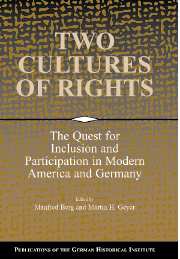Book contents
- Frontmatter
- Introduction
- Part 1 Race, Immigration, and Rights
- 1 Asian Americans: Rights Denied and Attained
- 2 Individual Right and Collective Interests: The NAACP and the American Voting Rights Discourse
- 3 Securing Rights by Action, Securing Rights by Default: American Jews in Historical Perspective
- 4 From Civil Rights to Civic Death: Dismantling Rights in Nazi Germany
- 5 The Rights of Aliens in Germany and the United States
- Part Two Civil and Social Rights
- Part Three Gender, Sex, and Rights
- Index
4 - From Civil Rights to Civic Death: Dismantling Rights in Nazi Germany
Published online by Cambridge University Press: 05 January 2013
- Frontmatter
- Introduction
- Part 1 Race, Immigration, and Rights
- 1 Asian Americans: Rights Denied and Attained
- 2 Individual Right and Collective Interests: The NAACP and the American Voting Rights Discourse
- 3 Securing Rights by Action, Securing Rights by Default: American Jews in Historical Perspective
- 4 From Civil Rights to Civic Death: Dismantling Rights in Nazi Germany
- 5 The Rights of Aliens in Germany and the United States
- Part Two Civil and Social Rights
- Part Three Gender, Sex, and Rights
- Index
Summary
When Adolf Hitler and the National Socialists came to power in January 1933 they launched an immediate assault on the legal structures that protected the civil and human rights of Germany's citizens. They began with physical harassment, to which they quickly added legislation that discriminated against those they deemed enemies of their cause. The assault ended with the mass murders effected in the death factories of eastern Europe. No political movement in modern times has more fundamentally rejected the belief in human rights than the Nazis - a belief they claimed reached its full expression in the Enlightenment of the eighteenth century and its actualization in the French Revolution of 1789. Nazi leaders soon made clear their intention to erase from the pages of history the rights proclaimed by the French Revolution. For them 1789 was the juncture at which history took the wrong turn. The events in France that year were rooted in concepts they considered abhorrent, including the right to political participation, civic and legal equality, the emancipation of the Jews, and that rights were inherent in the individual and therefore limited the authority of the community or group. They viewed every one of these ideas as foreign constructs that had been transplanted to German soil during the previous century and had then, quite illegitimately, been enshrined in the detested Weimar constitution of 1919.
- Type
- Chapter
- Information
- Two Cultures of RightsThe Quest for Inclusion and Participation in Modern America and Germany, pp. 77 - 94Publisher: Cambridge University PressPrint publication year: 2002

